Hands-On Review of Leading Ecommerce AI Agents
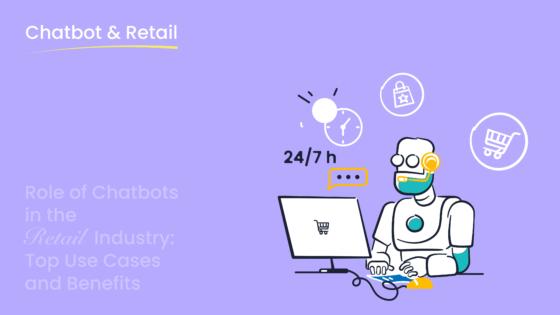
E-commerce businesses increasingly rely on AI agents for ecommerce to enhance customer service, sales, and support. Reviews show that leading solutions like Sobot AI automate over 95% of customer interactions, boost conversion rates, and reduce service costs by up to 30%. Sobot’s omnichannel capabilities and the reliability of the Sobot call center help brands like Weee! achieve an impressive 96% customer satisfaction score. Most customers prefer AI-powered self-service, and 90% of companies believe that Sobot AI agents provide a significant competitive edge.
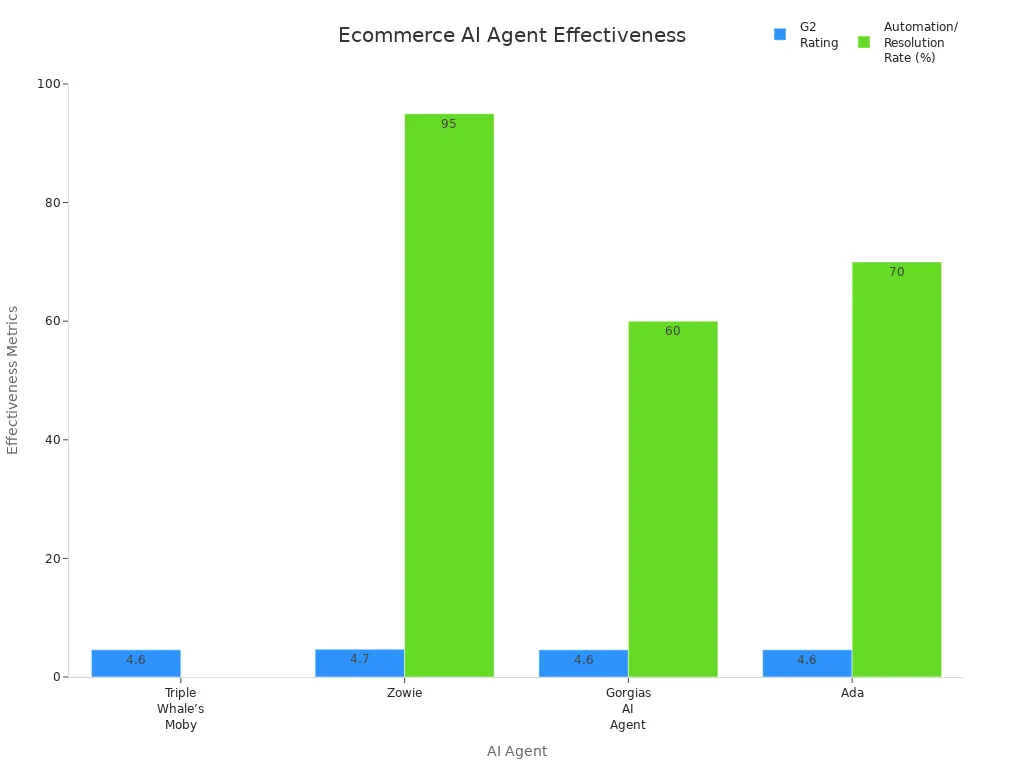
AI Agents for Ecommerce
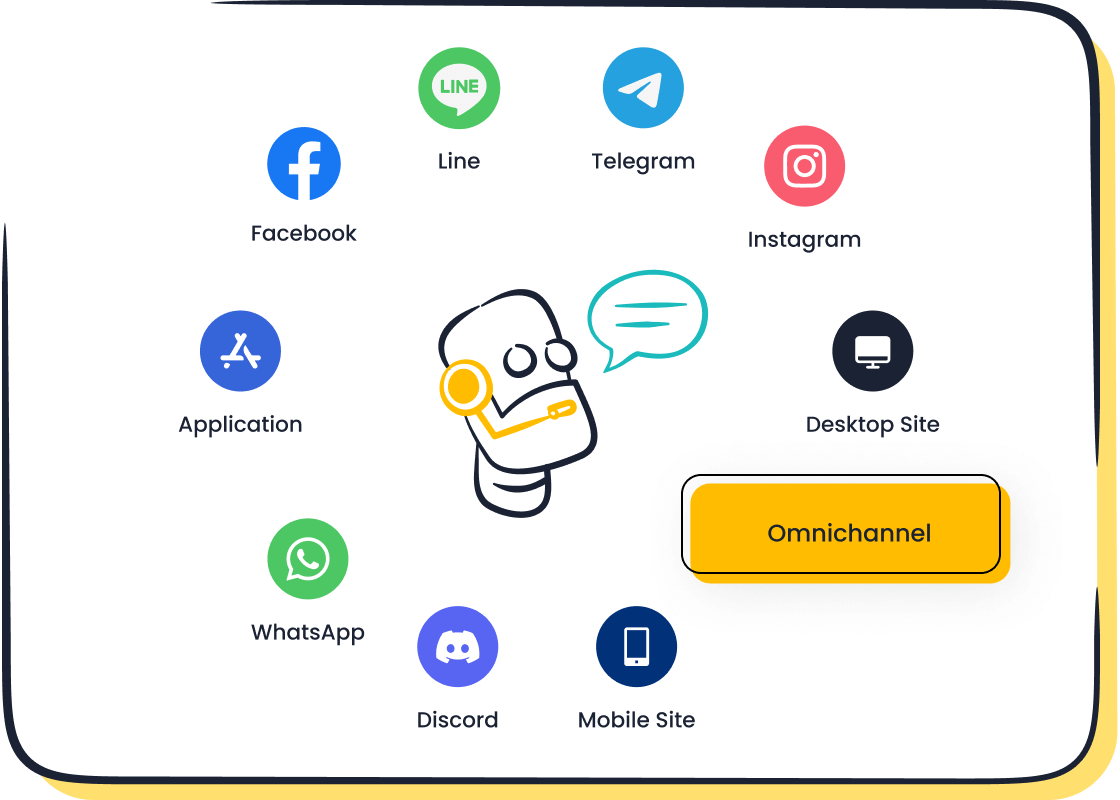
What Are AI Agents?
AI agents for ecommerce are intelligent systems that automate tasks and interact with customers across digital platforms. These agents use advanced algorithms to understand user intent, answer questions, and guide shoppers through the buying process. Common types include customer service chatbots, virtual shopping assistants, product recommendation engines, inventory management agents, and fraud detection systems.
- Customer service chatbots handle inquiries, order tracking, and post-sale support.
- Virtual shopping assistants engage users, recommend products, and personalize the shopping journey.
- Product recommendation engines analyze browsing and purchase history to suggest relevant products.
- Inventory and supply chain agents optimize stock levels and logistics.
- Fraud detection agents monitor transactions for suspicious activity.
Sobot’s AI shopping agents combine these capabilities, offering omnichannel support and multilingual interaction. Sobot’s chatbot, for example, automates customer service and product description generation, helping businesses manage product data efficiently.
Key Functions in Ecommerce
AI agents for ecommerce perform several core functions that drive business success:
- Autonomous decision-making: Agents interpret data and make choices to meet ecommerce goals.
- Task planning: They break down objectives into manageable steps.
- Data analysis: Agents generate insights from sales and inventory data.
- Customer interaction: They provide personalized responses and adapt to feedback.
- Marketing optimization: Agents run campaigns and personalize promotions.
- Inventory forecasting: They predict stock needs and coordinate supply chains.
- Continuous learning: Agents improve performance over time.
AI shopping agents automate routine tasks like product description generation, order tracking, and product data management. Sobot’s AI agents operate 24/7, boosting efficiency and customer satisfaction.
Tip: AI agents in e-commerce can increase conversion rates by 20% and reduce service costs by up to 30% (source).
Industry Standards
Industry standards for AI agents in ecommerce focus on accuracy, engagement, response time, and operational efficiency.
| Aspect | Description & Examples |
|---|---|
| Performance Metrics | Accuracy, engagement, response time, efficiency during high-traffic events. |
| Personalization | Tailored product suggestions based on customer behavior. |
| Operational Efficiency | AI-driven inventory management and cost reduction. |
| Real-time Decision Making | Dynamic pricing and instant inventory adjustments. |
| Integration & Data Quality | Seamless integration with CRM, ERP, and inventory systems. |
| Continuous Monitoring | Ongoing tracking and feedback for retraining. |
| Emerging Trends | Hyper-personalization, AR shopping, autonomous checkout. |
AI agents for ecommerce must integrate with existing systems and maintain high data quality. Benchmarks like REAL Bench evaluate agents in realistic scenarios, measuring speed, accuracy, and adaptability. Sobot’s AI agents meet these standards, supporting secure, scalable, and user-friendly solutions for e-commerce businesses.
Choosing an E-Commerce AI Agent
Evaluation Criteria
Selecting the right ai agent for ecommerce starts with clear goals. Businesses must decide if they need customer assistance, fraud detection, or product search. The next step is to look for a provider with proven e-commerce experience. Data quality matters because ai agents for ecommerce rely on accurate information to deliver results. Companies should use advanced technologies like machine learning and natural language processing to ensure scalability. Testing and pilot runs help validate performance before full deployment. Seamless integration with existing e-commerce platforms is essential. Ongoing monitoring and regular updates keep the ai agent for ecommerce effective as business needs change.
Sobot’s chatbot meets these criteria by offering omnichannel support, multilingual capabilities, and a no-code setup. This approach allows businesses to automate customer service and sales tasks efficiently.
Integration and Usability
Integration challenges often arise when connecting ai agents for ecommerce to legacy systems or popular platforms like Shopify. Some solutions require technical expertise, while others offer drag-and-drop simplicity. Sobot stands out with its point-and-click interface, making deployment easy for teams without coding skills. The platform supports integration across chat, email, voice, and social media, unifying customer interactions in one workspace. This reduces complexity and speeds up onboarding. Sobot’s flexible APIs also allow businesses to connect with their existing e-commerce tools, ensuring smooth automation and ai-driven support.
| Platform | Integration Complexity | Usability Highlights |
|---|---|---|
| Sobot | Low | No-code, omnichannel, multilingual |
| Shopify AI | Low | Plug-and-play for Shopify stores |
| Vue.ai | High | Requires technical resources |
Support and Compliance
E-commerce ai agents must provide strong support and comply with data privacy laws. Top ai solutions offer 24/7 service, predictive analytics, and workflow automation. Sobot delivers these features, helping businesses handle order tracking, refunds, and customer inquiries at any time. The platform follows strict security standards, including GDPR compliance, data encryption, and regular audits. Sobot enables user consent management and transparent data practices, building trust with customers. Businesses benefit from ongoing support, training, and consulting to maximize the value of their ai agent for ecommerce.
Note: Choosing an ai agent for ecommerce that excels in automation, integration, and compliance ensures long-term success in a competitive market.
Top AI Shopping Agents Compared
Feature Comparison Table
AI shopping agents for e-commerce have evolved to deliver advanced capabilities that drive business growth. The best ai agents for ecommerce stand out by understanding user intent, learning from customer behavior, and executing complex tasks such as returns and product recommendations. These agents engage customers across web, mobile, social media, and voice channels. They deliver personalized shopping experiences at scale, optimize cart recovery, and provide always-on support. Sobot’s AI agents for ecommerce offer omnichannel support, multilingual interaction, and no-code setup, making them ideal for businesses seeking efficiency and scalability.
| AI Agent | Key Differentiating Features |
|---|---|
| Sobot | Omnichannel, multilingual, no-code setup, product description generation, 24/7 support, customizable workflows |
| General Agents | Web chat, email, multichannel integrations, mobile management, multilingual chatbot support |
| Intercom | Smart visitor segmentation, workflow automation, chatbot templates, analytics |
| HubSpot | CRM integration, automated support and sales, unified inbox, AI-driven routing |
Tip: The best ai agents for ecommerce deliver rapid, human-like responses and handle returns, refunds, and exchanges with minimal human intervention.
Best Use Cases
Businesses use ai shopping agents for a variety of e-commerce scenarios. The best ai agents for ecommerce automate customer service, personalize product recommendations, and optimize cart recovery. Sobot’s AI agents for ecommerce excel in product description generation, proactive engagement, and seamless integration with platforms like WhatsApp and SMS. Retailers leverage these agents to manage high volumes of product inquiries, automate returns, and deliver targeted promotions. AI agents also improve inventory forecasting and streamline order tracking, enhancing the overall shopping experience.
- Personalized product recommendations based on browsing and purchase history
- Automated product support and order tracking
- Efficient handling of returns and refunds
- Proactive cart recovery and conversion optimization
- Multilingual customer service across channels
In real-world scenarios, top ai shopping agents boost customer engagement and satisfaction. For example, Sobot’s AI agents for ecommerce helped Weee! achieve a 96% customer satisfaction score by automating product support and streamlining communications (source).
Pricing Overview
Pricing models for the best ai agents for ecommerce vary based on complexity and usage. Traditional SaaS models charge per user, while usage-based and outcome-based models align costs with actual AI-driven activities. Hybrid models combine fixed and variable elements, offering flexibility for businesses with mixed needs.
| Pricing Model | Cost Predictability | Scalability | Best For | Key Risk |
|---|---|---|---|---|
| Pay Per Use | Low | High | Variable workloads | Unpredictable expenses |
| Subscription-Based | High | Moderate | Stable usage | Paying for unused capacity |
| Performance-Based | Medium | Varies | ROI-focused businesses | Hard to track performance metrics |
| Hybrid | Varies | High | Mixed needs | Complexity in tracking |
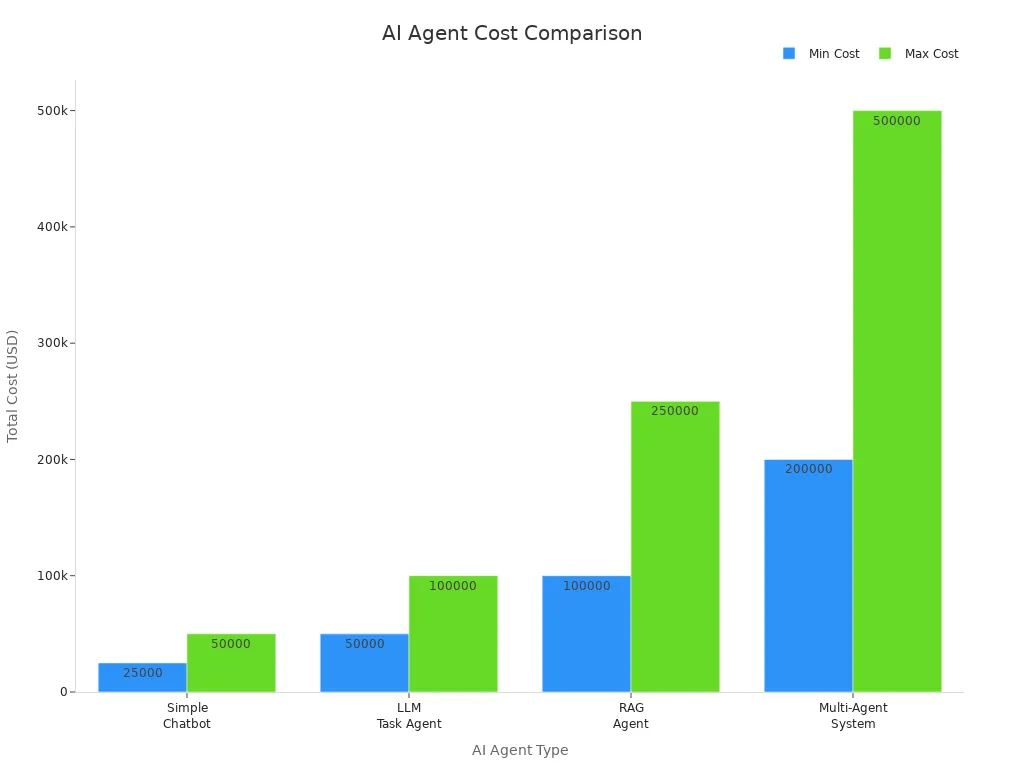
A mid-sized e-commerce business deploying a contextual AI agent for customer service can expect costs between $40,000 and $70,000. More advanced agents with autonomous capabilities may range from $80,000 to $120,000 or higher. Sobot’s scalable pricing and customizable workflows help businesses control costs while maximizing product support and customer engagement.
Sobot Chatbot in Action
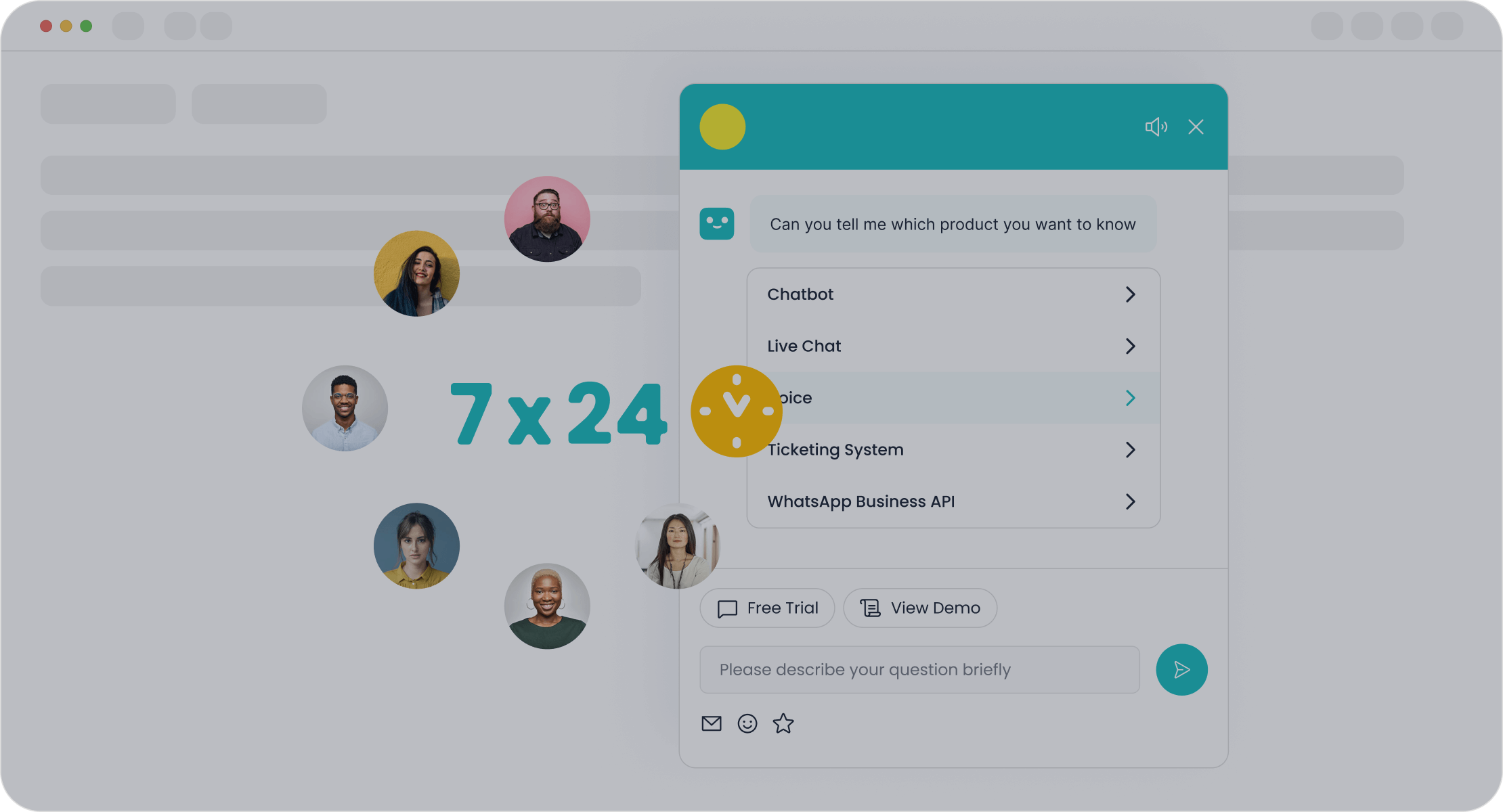
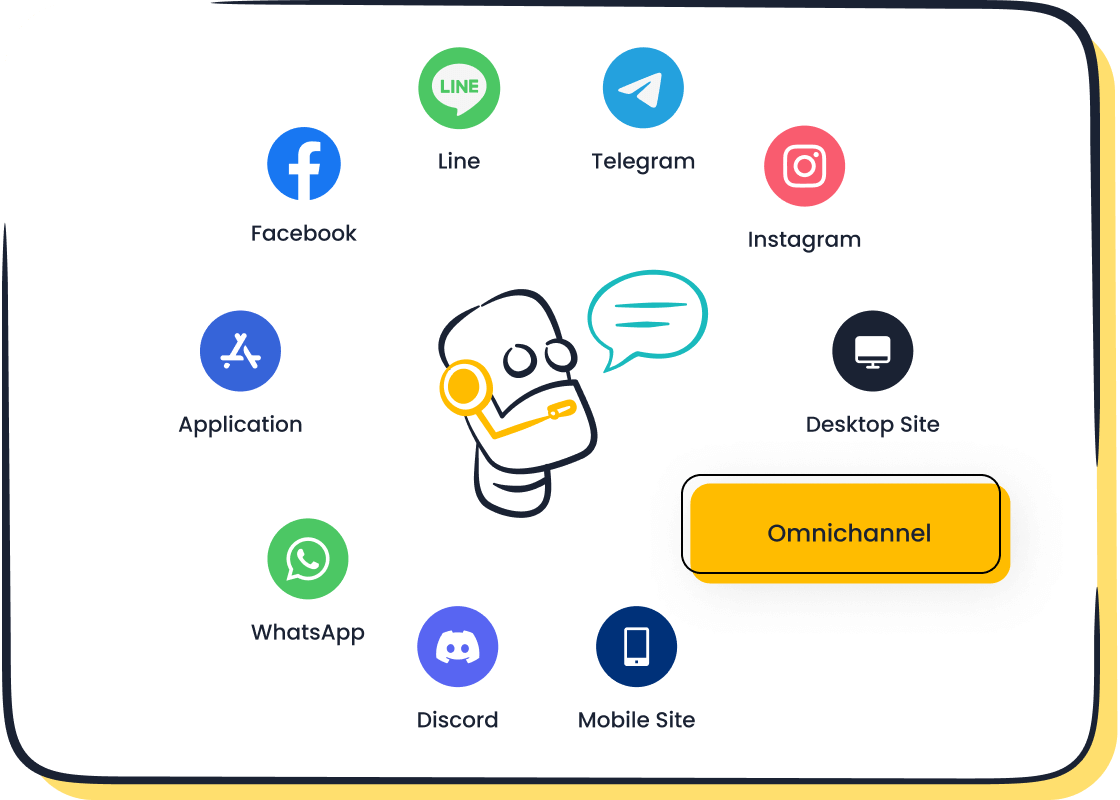
Overview and Core Features
Sobot Chatbot stands out as an advanced ai-powered agent designed for e-commerce businesses seeking to automate and elevate customer interactions. The platform delivers a suite of features that address the most pressing needs in ecommerce operations. Companies benefit from 24/7 automated customer service, which ensures support remains available beyond traditional business hours. Multilingual support capabilities allow brands to engage with a global audience, breaking down language barriers and expanding market reach.
Sobot integrates an intelligent knowledge base, enabling the ai to provide accurate and context-aware responses to product inquiries. The no-code implementation empowers teams to deploy and customize the chatbot without technical expertise, reducing setup time and complexity. Advanced analytics and reporting tools give managers deep insights into customer interactions, helping them optimize workflows and improve satisfaction scores.
Omnichannel interactions form the backbone of Sobot’s approach. The chatbot unifies conversations across chat, email, voice, and social media, delivering a consistent experience regardless of platform. This seamless integration ensures that customers receive instant and accurate responses whether they reach out via WhatsApp, Facebook, or a website live chat. Sobot’s scenario-based ai covers the entire purchase journey, from pre-sales product questions to post-sales support, driving operational efficiency and revenue growth.
Sobot Chatbot’s core features include:
- 24/7 automated customer service
- Multilingual support for global engagement
- Intelligent knowledge base integration
- No-code setup for easy adoption
- Advanced analytics and reporting
- Seamless omnichannel interactions
These capabilities position Sobot as a leader in e-commerce ai solutions, helping businesses deliver personalized, efficient, and scalable customer support.
Real-World Results (Weee! Case)
Weee!, America’s largest online Asian supermarket, provides a compelling example of Sobot Chatbot’s impact on ecommerce operations. The company faced challenges with inflexible IVR systems, language barriers, and complex system switching. Sobot’s solution addressed these issues by implementing a flexible IVR system, an integrated workbench, and robust multilingual support.
After deploying Sobot, Weee! saw agent efficiency increase by 20%. The resolution time for customer inquiries dropped by 50%, allowing agents to handle more requests in less time. The customer satisfaction score reached 96%, reflecting the effectiveness of Sobot’s ai-powered agent in delivering fast and accurate support. Weee! also benefited from seamless integration with their ticketing system, which streamlined operations and reduced the need for manual system switching.
Sobot’s omnichannel and multilingual capabilities played a crucial role in these results. The chatbot provided instant responses across multiple channels, ensuring customers received consistent support regardless of how they contacted the company. Multilingual templates and time zone settings enabled agents to serve a diverse customer base, including Chinese, Hispanic, Korean, and Vietnamese shoppers. The open API facilitated integration with existing systems, further enhancing operational efficiency.
“Sobot’s flexible IVR and multilingual support allowed us to personalize customer interactions and resolve issues faster. Our satisfaction scores improved, and our agents became more efficient.” — Weee! Operations Manager
The Weee! case demonstrates how Sobot Chatbot can transform ecommerce customer service, driving measurable improvements in efficiency, cost savings, and satisfaction.
Pros and Value
Sobot Chatbot delivers significant advantages for e-commerce businesses aiming to optimize product support and customer engagement. The platform’s ai-powered agent leverages advanced natural language processing to provide accurate and contextual responses, improving the quality of every interaction. Continuous machine learning ensures the chatbot adapts and personalizes its approach over time, enhancing customer satisfaction and loyalty.
Companies experience a smooth transition between automated chatbot support and live human agents for complex queries. The user-friendly interface allows brands to customize chatbot flows, matching their unique voice and business needs. Sobot’s analytics dashboard offers over 300 statistical reports and thousands of indicators, giving managers actionable insights into performance metrics and customer behavior.
The chatbot’s multi-language support enables businesses to serve a global audience without hiring additional bilingual staff, reducing expenses. Robust integration options connect Sobot with CRM systems, knowledge bases, and third-party tools, streamlining operations and boosting conversion rates. Proactive engagement features, such as triggered messages based on user behavior, help recover abandoned carts and guide shoppers through their journey.
Sobot’s comprehensive ticketing system ensures efficient issue tracking and resolution, while sentiment analysis gauges customer satisfaction and identifies potential problems early. The platform’s cost efficiency stands out, with pricing starting as low as $30 per month for small and medium businesses. Klarna reported a 40% reduction in customer service costs per transaction after implementing Sobot, and Motel Rocks achieved a 43% ticket deflection, lowering support workload and expenses.
Key benefits of Sobot Chatbot for ecommerce:
- Up to 90% reduction in customer response times
- 30% decrease in customer service expenses
- 67% increase in sales conversions due to faster, tailored interactions
- Recovery of up to 25% of abandoned shopping carts
- 83% of online shoppers more likely to complete purchases with chatbot-assisted promotions
- For every $1 invested, businesses see $3–$5 in cost savings and revenue growth (source)
Sobot’s omnichannel integration covers major ecommerce platforms and social media channels, ensuring consistent product support and customer engagement. The ai-driven automation tailors responses to specific ecommerce scenarios, from product recommendations to order tracking. Secure ai technology guarantees data privacy and compliance, building trust with customers and protecting sensitive information.
E-commerce businesses that adopt Sobot Chatbot gain a competitive edge through enhanced operational efficiency, improved customer satisfaction, and measurable cost savings. The platform’s scalability and flexibility make it suitable for companies of all sizes, from startups to global enterprises.
E-Commerce AI Agents: Use Cases
Customer Service Automation
E-commerce businesses rely on automation to deliver fast, reliable service. AI agents now handle a wide range of ecommerce customer service tasks, from answering product questions to processing returns. These agents integrate with platforms like Shopify and CRM systems, accessing real-time data to resolve issues. They automate up to 80% of repetitive tickets across chat, email, and social media, freeing human agents for complex cases. Sobot’s AI-driven support enables seamless omnichannel service, ensuring customers receive consistent help on every channel. The platform applies business logic, follows company policies, and provides smart handoffs to human agents when needed. Performance metrics such as resolution rates and customer satisfaction scores help measure ROI and improve service quality.
| Aspect | Explanation |
|---|---|
| Integration | Connects with e-commerce platforms, CRM, and shipping tools |
| Autonomous Actions | Issues refunds, checks order status, handles returns, updates orders |
| Ticket Automation | Automates 40-80% of repetitive tickets across channels |
| Omnichannel Support | Delivers service on chat, email, and social media |
| Performance Measurement | Tracks resolution rates, CSAT, and time savings |
Tip: Automation in ecommerce customer service leads to faster responses and higher customer satisfaction.
Personalized Recommendations
AI agents transform the shopping journey with personalized recommendations. By analyzing customer behavior, purchase history, and product attributes, these systems deliver a personalized ai experience that boosts engagement and sales. Sobot’s AI agents use advanced algorithms to suggest relevant products, increasing average order value and conversion rates. Personalization drives up to 15% revenue uplift and can increase average order value by 369% (McKinsey). Amazon attributes 35% of its revenue to personalized recommendations, showing the power of ai-driven product discovery in e-commerce.
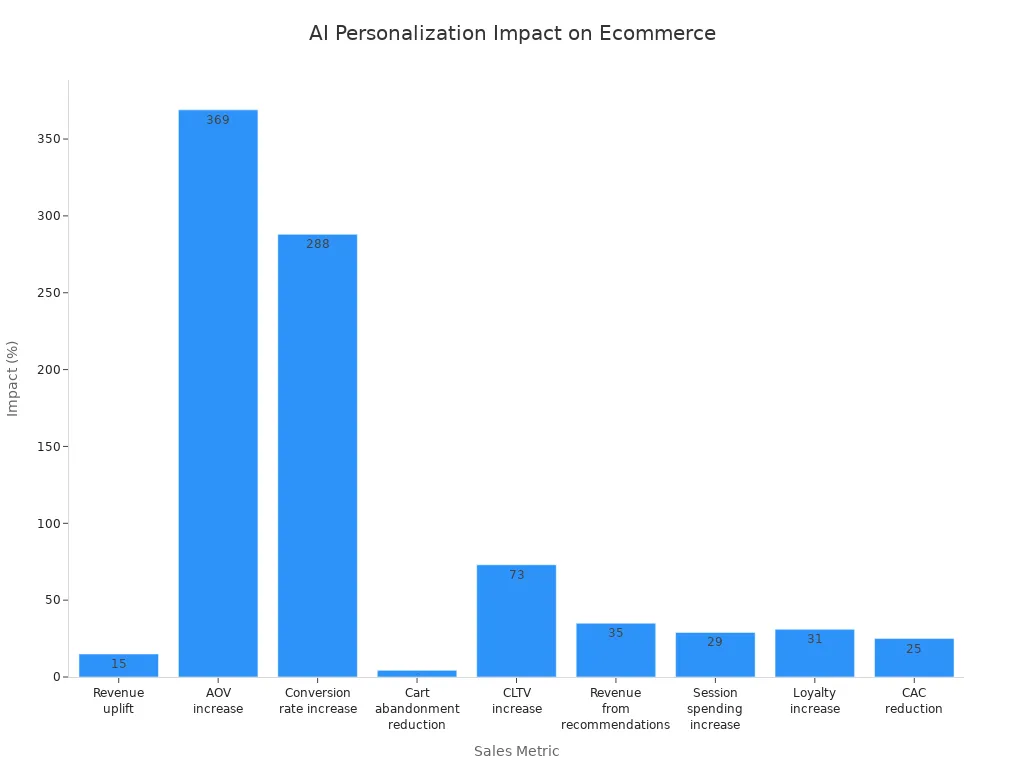
AI-powered recommendations also reduce cart abandonment and increase customer loyalty. Customers who interact with these suggestions spend more per session and are more likely to return, making personalization a key driver of hyper-personalized customer engagement.
Cart Recovery and Sales
Cart abandonment remains a challenge in e-commerce. AI agents address this by using predictive analytics to identify at-risk customers and engage them with timely reminders or incentives. Sobot’s automation tools send personalized messages through email, SMS, and social media, encouraging customers to complete their purchases. Dynamic pricing and exit-intent pop-ups further increase conversion rates. Studies show that smart product recommendations can contribute up to 30% of total online retail revenue. AI-driven analytics help businesses understand why customers abandon carts and optimize checkout processes. Campaign automation ensures that every customer receives the right message at the right time, improving engagement and driving sales.
AI agents in e-commerce not only automate customer service but also power campaign automation, product discovery, and customer engagement, making them essential for modern online retail.
Which AI Agent for Ecommerce?
Reviews show that leading ecommerce AI agents deliver strong product support, personalized recommendations, and efficient customer service. Sobot stands out with omnichannel product automation and multilingual product engagement. Businesses should match product features to their customer needs. Small stores may benefit from simple product automation, while larger brands need advanced product analytics and product integration. Customer reviews highlight the impact of product-driven AI on satisfaction and sales. Sobot offers a free product demo for those seeking to improve customer experience. For further research, explore product case studies and customer feedback.
FAQ
What is an ai agent for ecommerce?
An ai agent for ecommerce is a software tool that automates tasks like customer service automation, product support, and personalized recommendations. Sobot’s ai shopping agents help businesses handle inquiries 24/7, improve efficiency, and boost conversion rates. Learn more at Sobot Chatbot.
How does Sobot improve product support for online stores?
Sobot’s ai shopping agents provide instant product support across chat, email, and social media. The platform uses a multilingual knowledge base and no-code setup, enabling stores to resolve 90% of inquiries automatically. This leads to higher customer satisfaction and reduced service costs.
Can ai shopping agents help with cart recovery?
Yes. Ai agents for ecommerce, including Sobot, use predictive analytics and proactive messaging to recover abandoned carts. Businesses report up to 25% more completed purchases when using customer service automation tools that send reminders and incentives to shoppers.
Tip: Cart recovery powered by ai shopping agents increases sales and reduces lost revenue.
Is Sobot’s ai agent for ecommerce easy to integrate?
Sobot offers a point-and-click interface and flexible APIs for seamless integration. Teams can connect Sobot’s ai shopping agents with platforms like Shopify, CRM systems, and ticketing tools without coding. This simplifies deployment and enhances product support.
What data privacy measures does Sobot use?
Sobot’s ai agent for ecommerce follows strict security standards. The platform uses GDPR compliance, data encryption, and regular audits to protect customer information. Businesses can manage user consent and maintain transparency, building trust with shoppers. Read more at Sobot AI Solution.
See Also
Evaluating Artificial Intelligence Solutions For Enterprise Call Centers
Best Live Chat Platforms For Ecommerce Businesses In 2024
Comparing The Leading Live Chat Tools For Shopify And Others
Ways Chatbots Enhance Customer Satisfaction In Ecommerce
Increasing Ecommerce Sales With Effective Live Chat Software
